| Srl | Item |
| 1 |
ID:
151987


|
|
|
|
|
| Summary/Abstract |
Since the Asian financial crisis, the Association of Southeast Asian Nations (ASEAN) has sought to reorient itself towards becoming a ‘people-oriented’ association. Democratic transitions in the region and increased demands from civil society to be actively involved in regional governance have prompted ASEAN to develop forms of participatory regionalism. In practice, however, the rhetorical aspirations of ASEAN have not often matched the level of participation or support expected by civil society organisations. It has often been the case that ASEAN's decisions, especially those related to sensitive issues, have been influenced by external pressure as opposed to participatory mechanisms. The aim of this article is to determine to what extent participatory mechanisms impact ASEAN's approach to non-traditional security. By doing so, the authors combine two key elements central to a ‘people-oriented’ approach to regionalism: the incorporation of deliberative and participatory processes and the acknowledgement of transboundary security issues which require cooperation to move beyond state-centric approaches. This article explains that despite the rhetorical emphasis on participatory regionalism, it continues to be the case that regional civil society organisations and non-state actors have limited capacity to influence ASEAN. By providing a critical analysis of influences on ASEAN's non-traditional security policies, the authors offer a modest yet valuable contribution to the emerging literature on ASEAN's ‘people-oriented’ regionalism and advance a nuanced understanding of ASEAN's participatory mechanisms.
|
|
|
|
|
|
|
|
|
|
|
|
|
|
|
|
| 2 |
ID:
075239
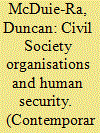

|
|
|
|
|
| Publication |
2006.
|
| Summary/Abstract |
This paper examines the limitations on civil society organisations (CSOs) in India's Northeast, specifically the state of Meghalaya, and suggests some strategies they must pursue to overcome them. The majority of literature concerning the Northeast tends to focus on national security, insurgency and violence, with a limited analysis of the role of CSOs and the human security of people living in these circumstances. CSOs in the Northeast face restrictions from above by the central government and the military, and from below by insurgent organisations and ethno-nationalist movements; in other words, by civil society itself. While the struggle for autonomy and rights in the Northeast looks set to continue, the effectiveness of CSOs is being further jeopardised as they are caught between these more powerful actors. The functioning of CSOs is being curtailed, and the lives and needs of people living between these poles are being neglected. Using Meghalaya as an example, this paper discusses the consequences for human security and the limitations faced by CSOs operating in the region. The paper argues that, in order to more effectively empower the people in the region, CSOs need to transcend co-optation from above and below, and focus on local human security issues rather than nationalist or ethno-nationalist agendas.
|
|
|
|
|
|
|
|
|
|
|
|
|
|
|
|
| 3 |
ID:
158979
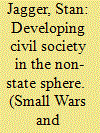

|
|
|
|
|
| Summary/Abstract |
Armed groups are usually seen as threats to humanitarian action but less attention has been paid where they provide assistance to constituent populations. Ethnic armed groups (EAGs) in Myanmar have developed associated welfare organisations that perform this role. This article argues this is due to EAG social embeddedness and flexibility to changes in sources of funding and support, and the influence of their relations with international humanitarian organisations. This article further contends a subset of advocacy, health and education organisations have evolved to form a nascent civil society within the political and social non-state sphere of some established EAGs.
|
|
|
|
|
|
|
|
|
|
|
|
|
|
|
|
| 4 |
ID:
090650
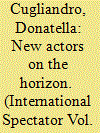

|
|
|
|
|
| Publication |
2009.
|
| Summary/Abstract |
Italian civil society organisations are holding more and more sway in the foreign policy arena, strengthening links with their counterparts both in the European Union and further abroad. Some well-organised groups are increasingly capable of wielding influence in the international scenario, mainly thanks to their initiatives directed at fuelling citizens' interests in sensitive issues and fostering transnational cooperation. In parallel with these global trends, Italian civil society is going through a period of change and reassessment, shaken by the need to protect some core values to which it is undeniably attached.
|
|
|
|
|
|
|
|
|
|
|
|
|
|
|
|
| 5 |
ID:
142461
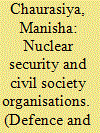

|
|
|
| 6 |
ID:
167101
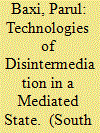

|
|
|
|
|
| Summary/Abstract |
The various lines of resistance against the Indian government’s Unique Identification Number project since its inception in 2009 form a national and publicly accessible narrative. But less is known about Aadhaar’s reception among civil society actors, non-profits who partnered with the state to implement this scheme among their constituencies. Drawing upon eighteen months of fieldwork in Mumbai, Ahmedabad and Delhi, this paper traces the nature of state and civil society engagement with Aadhaar. It demonstrates how this e-governance initiative encountered the politics and agendas of intermediary organisations long engaged in providing identity documents to the poor in the absence of state recognition of certain groups. The state sought a condition of disintermediation via biometric technology and collaborated with non-state actors to aid implementation. The failed encounter with a few non-profits working with the migrant poor demonstrates that a technocratic notion of identity and citizenship clashed with the materiality of local practices serving to maintain existing intermediations and resulting in exclusions from the Aadhaar scheme for certain groups. The paper argues that this encounter demonstrates the durability of the mediated state at a time when new technologies are deployed to remove intermediations, with consequences for the most marginalised populations.
|
|
|
|
|
|
|
|
|
|
|
|
|
|
|
|